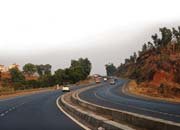There are many stakeholders with different priorities in the highway sector ? the government, private developer / investor, lenders, Users, project affected people and the society. The priority of the government lies in timely construction of roads and users getting a smooth riding quality. The private developer / investor is concerned about developing the project within the budget and getting an adequate return on investment. Lenders are worried about timely debt servicing and repayment of principal & interest by the concessionaries while road users hope to get good quality roads with reasonable toll rates. On the other hand the project affected people want to have a fair rehabilitation and resettlement assistance / compensation while the society at large needs a pollution-free and safe construction.
A major complaint that private developers in PPP projects have is that though the government controls many factors such as land acquisition, it is the developers who are faced with a very large number of risks – revenue & traffic risk, cost & time overrun risk and financing risk. These factors, coupled with the economic slowdown in 2008 led to a considerable decrease in highway projects awarded and a dwindling developer interest. The implementation of the reforms such as suggested by the B K Chaturvedi committee and the model concession agreement led to a upswing in the highways sector. But, again a slowdown in 2012-13 saw fewer players bidding for BOT projects with the financial capability of the players being stressed, bank funding for the projects a concern; the other concerns being land acquisition problems and environmental clearance. The sector is in a downturn and going through a consolidation phase. It needs active policy support for its revival.
A proposal from private developers which has found support of the NHAI is the rescheduling of premiums payable to the NHAI by the developers. The proposal calls for very low or no payment during initial 5-10 years, with ballooning repayment in later years. The proposal also calls for a discount rate of 10% on the Net Present Value (NPV) for rescheduling of the premiums. Premium Deferment should facilitate stalled projects, where the concessionaire has already made some investment, rather than revive non-starter projects.
NHAI has taken a number of initiatives for expediting highway projects. It has issued internal policy circulars to expedite land acquisition and clearances, and permit equity divestment by concessionaire right on the commercial operations date (COD). It has also made changes in the Model Concessionaire Agreement (MCA) to streamline and expedite regulatory processes. But these changes in the MCA are applicable to only new projects; concessionaire are grappling with problems in existing projects where support is most needed. An early resolution would save the concessionaire from substantial losses. The Cabinet Committee on Investment (CCI) is also playing an important role in fast-tracking resolution of stalled infrastructure projects. Set up in Jan 2013 to resolve issues in projects worth at least ?1,000cr, CCI has already resolved projects worth over ?1 lakh cr including four highway projects worth ?4,400cr. CCI?s active support would expedite resolution of issues.
Two major issues in payment of premiums to NHAI are the undue delays in land acquisition, and getting statutory clearances which cause severe financial strain on the projects. Due to this, developers have been asking for rescheduling of premium to have some relief from financial distress. The NHAI has proposed Revenue Sharing / Fixed Monetary Value and in both cases, no premium in the initial years. This would be good and may be adopted for fair risk sharing. There can be a upper limit on the revenue sharing by linking the share to a percentage of the Total Project Cost; this will discourage irrational bidding.
Toll Non-Compliance
Lack of adequate toll collection is one of the reasons for failure of highway projects. One factor in this is politically motivated agitations opposing toll collection. These agitations often result in damage to toll plazas and raise other security issues. Reliance Infrastructure has responded to this issue by having an adequate insurance cover and maintaining back-up equipment to resume toll operation at the earliest in case of vandalising attacks. It also regularly liaisons with government agencies at all levels to obtain their support.
Toll non-payment should be made a criminal offence. To share the loss in revenue, there should be a provision of additional O&M grant to the concessionaire. There should be concerted efforts needed to increase awareness and willingness to pay toll among road users. To avoid misuse of exemption from toll, government officials should be made to pay toll and the government should later reimburse them.
Traffic Assessment
Currently, CA provides for assessment of Actual Average Traffic vis-?-vis Target Traffic, only once at a date too far from Scheduled COD. In case of reduction in Traffic, increase in Concession Period is provided.
Traffic should be reviewed every three years from COD. A mechanism is needed to financially support traffic impacted projects, through interim grants / revenue shortfall loans. The Concessionaire needs to be adequately compensated for the loss it has to bear in NPV terms.




